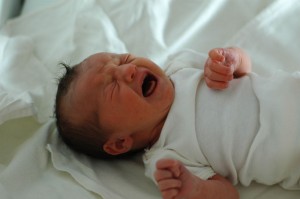Each of us is the product of a molecular battle fought by paternal and maternal genes during the earliest stages of development. Yale evolutionary biologist Stephen Stearns and his colleagues at the University of Copenhagen have determined that autism and schizophrenia may be extremes on a behavioral spectrum arising from this genetic clash.
The study, unprecedented in magnitude and scope, surveyed the life histories of 1.75 million Danish babies born between 1978 and 2009. Researchers found that larger than average babies had an increased risk for autism and a decreased risk for schizophrenia. Risk patterns for smaller than average babies were exactly opposite—an increased risk for schizophrenia and a decreased risk for autism. The theory supported by Stearns and his contemporaries takes an evolutionary perspective on explaining the variance in expression of paternal and maternal alleles during embryonic development.
The theory, termed the conflict theory of genetic imprinting, cites the opposed evolutionary-reproductive goals of parents. According to the theory, paternal alleles will tend to favor the development of robust, energetically demanding babies. Such offspring are more likely to survive and pass on a father’s genes. However, such pregnancies are typically energetically taxing for mothers. Accordingly, maternal alleles will tend to limit infant growth during fetal development.

The expression of predominately paternal alleles in those genes that influence behavior could lead to more behaviorally demanding babies.
If for a given gene, each allele is expressed equally, competition could be avoided. However the opportunity for epigenetic modification—the modulation of gene expression without the alteration of the gene itself—leads to conflict between paternal and maternal interests. Using infant birth size and weight as a proxy for assessing the outcome of this conflict, researchers attributed larger than average babies to the success of paternal interests. Maternal interests were assumed to have prevailed when infant birth size was significantly reduced. Working under these parameters, researchers found that infants of above average birth size were at a greater risk for autism. In contrast, infants of below average birth weight were more likely to develop schizophrenia.
Such results invited researchers to extend the evolutionarily minded conflict theory to genes other than those influencing infant size, namely those responsible for behavior. Paternal alleles can be interpreted to favor more behaviorally demanding infants, while maternal alleles can be interpreted to favor more easygoing children. From this perspective, autism and schizophrenia exist at extremes on a common behavioral spectrum.
In an interview with Yale News, Stearns acknowledges that “the theory isn’t generally accepted yet.” However, the evolutionary viewpoint taken by Stearns and his colleagues offers undeniably fresh insight into the cause of mental illness. Continued examination of mental disease from this perspective has the potential to lead to new, even more effective therapies and deepen our understanding of ourselves.
